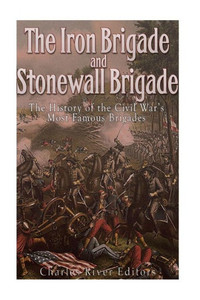*Includes pictures *Includes accounts of the battles written by soldiers *Includes online resources and a bibliography for further reading The title of "Iron Brigade" has been given to a number of different U.S. Army brigades over the last century and a half, but it has become almost entirely synonymous with the Civil War soldiers who fought in the brigade for the Army of the Potomac. Also known as the "Iron Brigade of the West," "Rufus King's Brigade" and the "Black Hat Brigade," the Iron Brigade was comprised of the 2nd, 6th, and 7th Wisconsin Volunteer Infantry Regiments, the 19th Indiana, Battery B of the 4th U.S. Light Artillery, and later, the 24th Michigan. Wisconsin governor Alexander William Randall had hoped to organize an all-Wisconsin brigade to contribute to the Union's Civil War effort, but the U.S. Army dispersed Wisconsin regiments to different areas as needs arose. Nevertheless, Wisconsin regiments comprised a majority of the brigade, and it would distinguish itself as the only all-Western brigade in the Army of the Potomac. It would come to be recognized for its unique uniforms, strong discipline, and "iron" disposition, earning the name during the Maryland Campaign both for its tenacity and for the costs paid by fighting so hard. The Eastern Theater of the Civil War saw the bloodiest and most famous battles, as well as the biggest losses, giving the brigade a chance to demonstrate its mettle during legendary confrontations with Robert E. Lee's Army of Northern Virginia, particularly at the battles of Second Bull Run, South Mountain, Antietam, and Gettysburg. In fact, the brigade suffered the highest percentage of casualties of any brigade in the Civil War, rendering it almost incapable of maintaining a fighting force by June 1864, during the middle of Ulysses S. Grant's Overland Campaign. General Thomas Jonathan Jackson and his brigade earned the nickname "Stonewall" at First Manassas by turning the tide of that battle, and they would become known as the legendary foot cavalry by bottling up 3 different Union armies in the Shenandoah Valley in 1862. Although Stonewall Jackson and the Stonewall Brigade may share the most famous nickname to come out of the Civil War, it's still unclear whether Barnard Bee, the general who provided the legendary name at First Manassas, meant it as a complaint that they were not moving or as a compliment for standing resolute in the heat of battle. Regardless, the Stonewall Brigade went on to fight in every major battle in the Eastern theater of the American Civil War, to the extent that of the 6,000 men who fought with the brigade over the course of four years, less than 200 remained by the time General Robert E. Lee surrendered at Appomattox Courthouse on April 9, 1865. They were organized, trained, and mentored by one of the most revered military leaders in American history, and they made a decisive impact on battles like First Manassas, the 1862 Valley Campaign, and Chancellorsville. The brigade was virtually a spent force by the end of the Battle of Spotsylvania Courthouse in May 1864, which took place nearly a year after Stonewall Jackson himself had been mortally wounded at Chancellorsville. Not only was the Stonewall Brigade present at most of the major engagements in the Eastern theater, more often than not, they were positioned at the edge of the front line of battle. It can be fairly stated that while these men may not have been more heroic or courageous than any other soldiers who fought in the Civil War, they appeared in the first wave of volunteers immediately after Virginia announced secession, were better trained, were more skillfully directed, and showed greater dedication to the cause and their leader than most regiments on either side of the conflict.
- | Author: Charles River Charles River Editors
- | Publisher: Createspace Independent Publishing Platform
- | Publication Date: Feb 19, 2018
- | Number of Pages: 256 pages
- | Language: English
- | Binding: Paperback
- | ISBN-10: 1985645068
- | ISBN-13: 9781985645066
